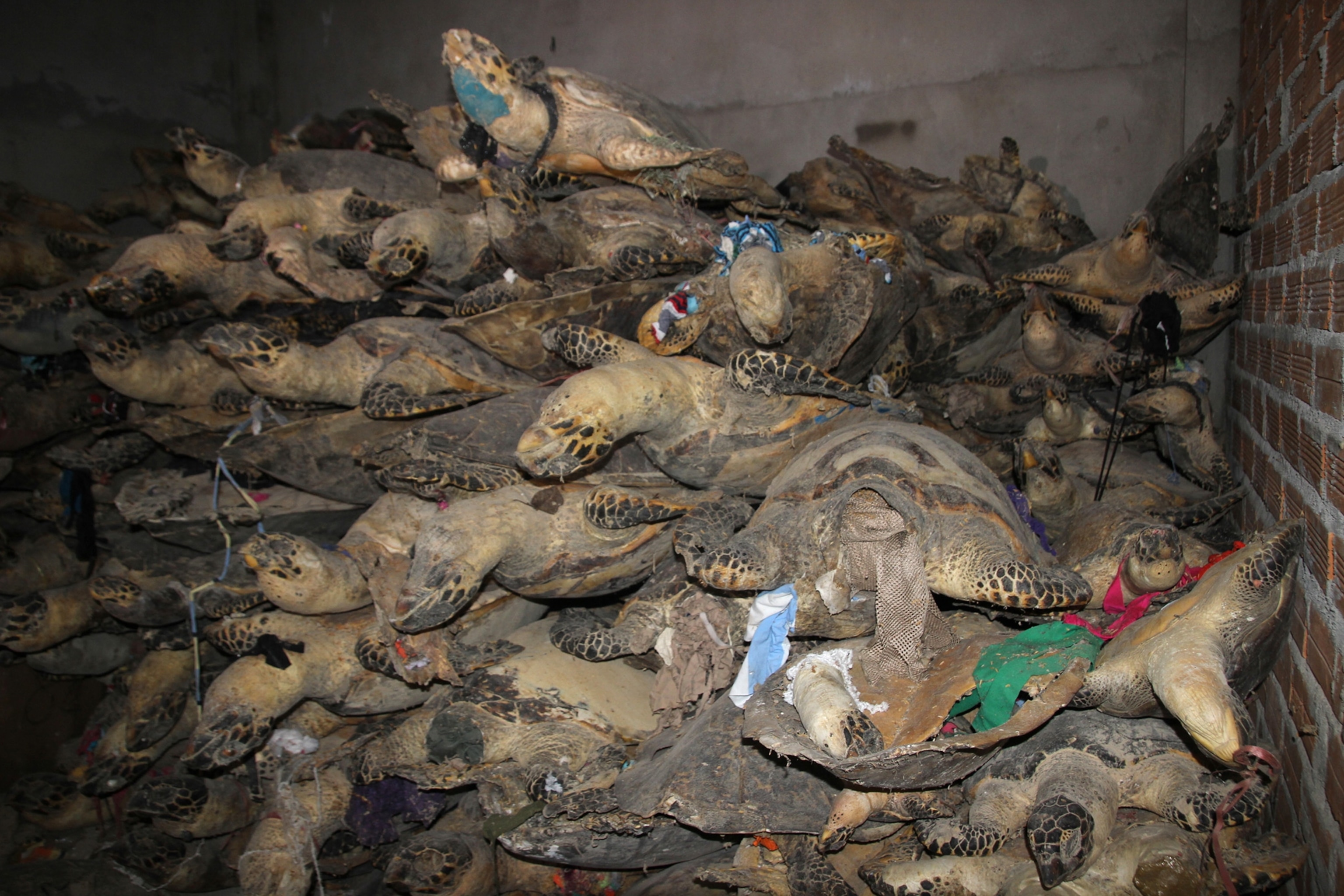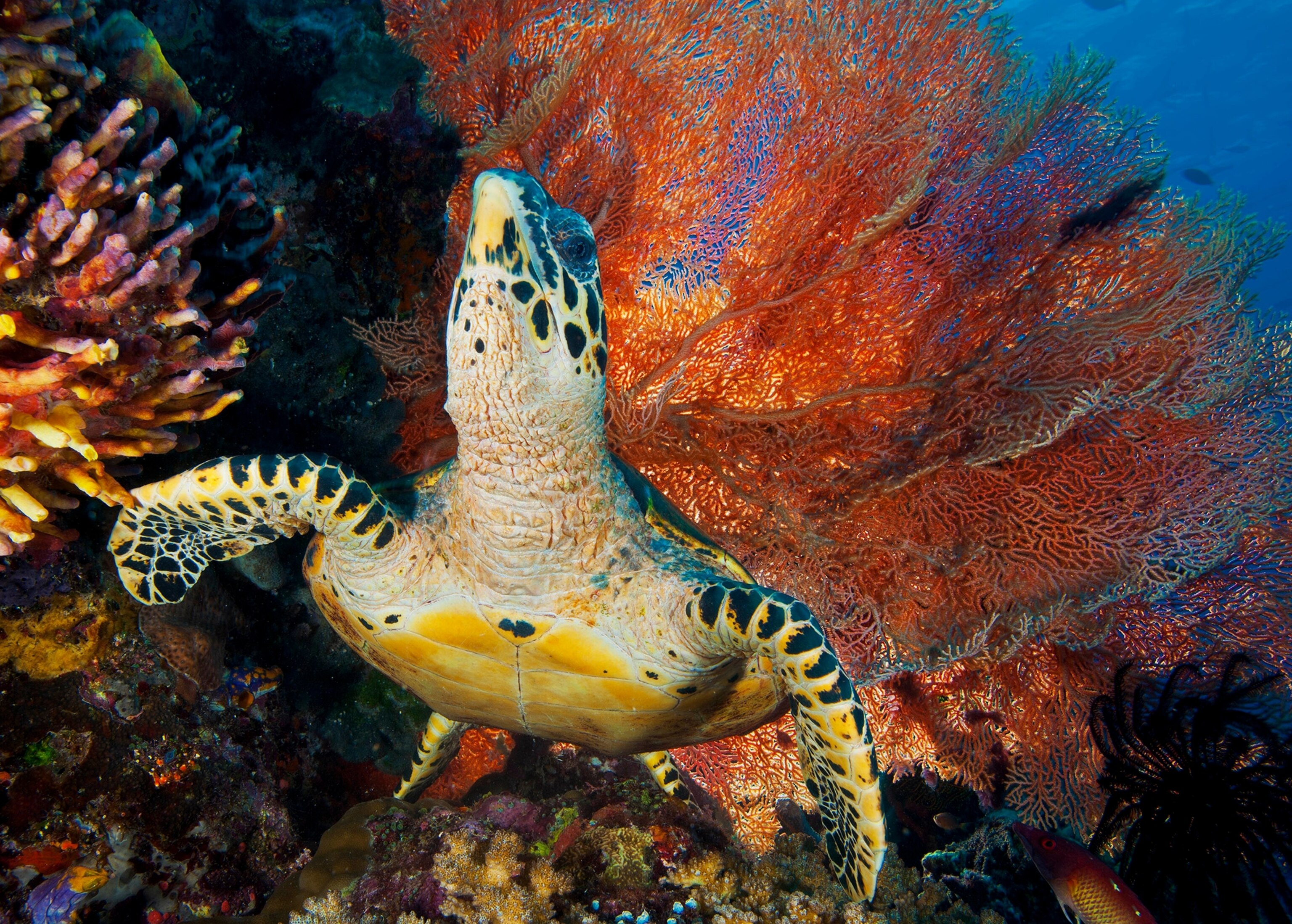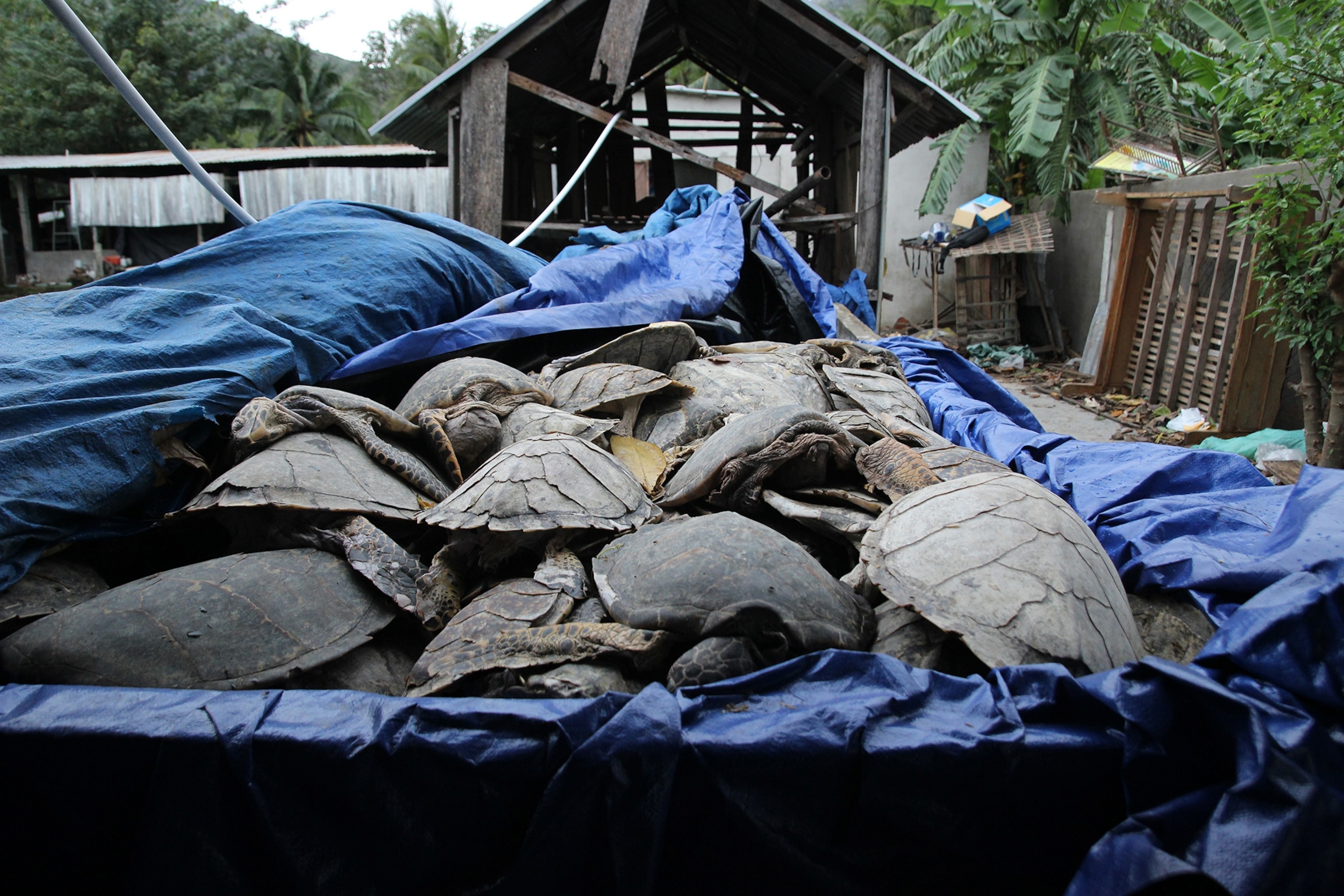
Huge Haul of Slain Sea Turtles Tests Vietnam
Vietnamese authorities seized 7,000 dead sea turtles in 2014, but the trader suspected of being behind the killings has yet to be arrested.
Mr. K had never imagined it would be this bad. After leading a three-year undercover investigation of sea turtle smuggling in Vietnam, his home country, those efforts had finally yielded tips from informants, landing him on the doorstep of three warehouses in a rural area outside Nha Trang, a beach town in Khanh Hoa Province, about 250 miles northeast of Ho Chi Minh City.
As the police wrenched open the door, the first thing that struck Mr. K was the smell: an intense chemical reek, mingled with the stench of death. The second was the sight of the sea turtles themselves—thousands of those endangered animals, stacked one atop the other right up to the roof. Two of the three warehouses revealed such a scene.
“To see so many marine turtles, well, it was shocking. It was crazy,” Mr. K says. (He asked that his real name not be used because he continues to lead undercover investigations in Vietnam.)
A second raid the following month at a nearby farm uncovered even more dead turtles. The police eventually tallied some 7,000—the largest cache of marine turtles ever found.
That was in November 2014, and Vietnam has yet to arrest or prosecute anyone for the crime, despite the fact that Mr. K’s investigation revealed evidence that a wealthy local businessman is the criminal mastermind.
Almost all were either fully or partially taxidermied, bound for China to be sold as trophies.
As months have turned into years, and the case continues to stagnate, conservationists have come to see it as representative of Vietnam’s failure to tackle the illegal wildlife trade.
“You can nail the middle and low-level players all you want, but you’re not going to have an impact on the trade unless you go after the people who are behind it,” says Douglas Hendrie, technical adviser with the nonprofit group Education for Nature-Vietnam (ENV), which is based in Hanoi. ENV spearheaded the investigation and was Mr. K’s employer at the time.
“This case is our litmus test,” Hendrie says, “a way to say, OK, Vietnam, show us that you’re serious about dismantling this trade like you say you are.”
Vietnam is a major force in the illegal wildlife trade, serving as a supplier, consumer, and transit country for illicit animal products moving from greater Southeast Asia into China. But in early 2014 Prime Minister Nguyen Tan Dung publicly stated his intention to dismantle organized criminal trafficking of protected animals.
Later that year marine turtles joined tigers, elephants, bears, and pangolins on Vietnam’s list of fully protected species. Trafficking in any of those species is a criminal offense, entailing immediate prosecution and carrying a jail sentence of up to seven years.

Mr. K got involved in the sea turtle case back in 2011 when a Vietnamese-registered fishing boat was seized in Philippine waters, and authorities found some 200 dead turtles on board. The following months saw several similar vessels turn up in Vietnam and the Philippines, all carrying dead turtles and registered to Sa Ky, a port in the central Vietnamese province of Quang Ngai.
So Mr. K headed to Quang Ngai, where he and ENV colleagues—posing as potential buyers, sellers, or students conducting research—asked around about sea turtles. They discovered a specialized group of divers who target marine turtles, and they met black market traders who buy those animals.
'You’re Talking Nonsense'
Rather than immediately alert authorities and encourage the prosecution of the low-level poachers and middlemen, Mr. K had set his sights on someone higher up the food chain: a suspected top trader said by lower-level traders and others to be behind the turtle crimes in Quang Ngai and beyond. (After the seizures, ENV transferred all information they’d gathered—including about the turtle poachers and middlemen—to the authorities.)
When National Geographic contacted the trader by phone, he replied that he knows nothing about the case. “You’re talking nonsense,” he said, before hanging up.
But Mr. K and ENV say that evidence from about a dozen sources links the man to the crimes, and he has a history of involvement with marine turtles. In 2009 authorities seized nearly 850 live sea turtles from a fish farm in Nha Trang, and the trader was fined 10 million Vietnamese dong (about U.S. $500 at the time) as “administrative punishment.”
Mr. K says that local people in the vicinity of the warehouses confirmed that the turtles belonged to the trader, while the owner of the farm where the second cache of turtles was found told police that the suspected trader’s relative asked him to keep the turtles there. Divers, fishermen, other traders, and even the police confirmed his involvement.
The police in this country are perfectly capable of getting their man—if they’re interested in getting him.Jake Brunner, International Union for Conservation of Nature
Several local sources confirmed the trader’s involvement to National Geographic, including that the warehouses belonged to him and that he is a well-known buyer of sea turtles. Bui Cao Phap, the vice president of the commune where the warehouses are located, also told National Geographic that those buildings belong to the man in question.
Hawksbill sea turtles are the critically endangered species that constituted the vast majority of the estimated 7,000 animals. Almost all were either fully or partially taxidermied, and according to the turtle traders Mr. K interviewed, they were bound for China to be sold as trophies.
Meanwhile, following the 2014 busts, another local man, Hoang Tuan Hai, turned himself in to the authorities to take responsibility for the crime. Hendrie and Mr. K believe that Hai, a subordinate, wanted to protect the top trader.
But even Hai has yet to be arrested or prosecuted, and no one seems to be investigating the other man’s involvement in the crime. “It’s been two years, but I feel like it’s been forever,” Mr. K says.
Apparent Immunity for Top Criminals
The 2014 seizures were covered extensively by the media in Vietnam and in brief by the international press. According to Hendrie, the Vietnamese government has seemed motivated to move ahead with a prosecution. “We’ve received very favorable responses at the central level that they’re committed to prosecuting this case,” he says.
But Vietnam has yet to prosecute a single high-level illegal wildlife trader, though smaller fry—poachers, smugglers, and middlemen—are frequently caught and punished.
“If the subject in this case was just an ordinary citizen, he’d be in prison by now,” says Bui Thi Ha, vice director of ENV and head of the organization’s policy and legislative team. “But he’s influential, and he’s rich, and he has influential friends.”
“The stall is coming from the province,” Hendrie says. By that he means the local authorities in Khanh Hoa Province, where the warehouses containing the turtles are located.

Ha says that provincial representatives have assured her that they’re pursuing an investigation and that they attribute the delay to everything from “difficulties in applying the law,” as they wrote in a 2015 letter to the Ministry of Public Security, to confusion about what species identification to give the turtles.
“Sometimes you read about these cases and think the Vietnamese police must be like the Keystone Cops, always a bit late to the scene while the culprit disappears out of the back window,” says Jake Brunner, the Vietnam program coordinator for the International Union for Conservation of Nature (IUCN), which sets the conservation status of species. “But that’s not accurate. The police in this country are perfectly capable of getting their man—if they’re interested in getting him.”
Representatives from Vietnam’s Ministry of Agriculture and Rural Development, Ministry of Public Security, Ministry of Natural Resources and the Environment, Directorate of Fisheries, and Supreme People's Procuracy either did not respond to interview requests, declined to answer questions for this story, or passed the buck.
“We don’t handle this case” was a common refrain. Le Dinh Hoan, Division 3 head of the Khanh Hoa Procuracy, asked National Geographic to call back after his lunch break but subsequently didn’t answer the phone. And Pham Trong Cuong, chief of the Khanh Hoa Investigative Police, responded, “Why on Earth are you asking for an interview over the phone? How do I know who you are?”
Exerting Pressure
But Ha confirms that various representatives at higher levels of the regional and national governments—almost always at ENV’s urging—have sent the Khanh Hoa authorities letters asking them to proceed with a prosecution.
The United States Embassy in Vietnam has also gotten involved in pushing for a resolution (embassy officials declined to be interviewed for this story). And a group of sea turtle experts sent a letter in April to Vietnam’s ambassador to the U.S., Pham Quang Vinh, asking him to “encourage officials in Vietnam to take their roles more seriously,” says Roderic Mast, president and CEO of the nonprofit Oceanic Society, based in Ross, California. Mast is also cochair of the IUCN’s Marine Turtle Specialist Group. “We’re hoping to trigger an inquiry, not pressure anyone,” he says.
“I have no doubt that there are people in the Vietnamese government who want to see this case prosecuted, but I also know that there are wildlife criminals in Vietnam and other countries who seem to be immune or untouchable,” says Earl Possardt, coordinator for the International Sea Turtle Program at the U.S. Fish and Wildlife Service. The service provided financial support for ENV’s initial investigation. “I think this case is really going to demonstrate how willing and able Vietnam is to start addressing and deterring wildlife trafficking.”
The IUCN’s Brunner adds that if cases like this fail to result in prosecutions, would-be informants might be discouraged from speaking up in the future. “If leaks don’t lead to anything, they potentially risk the welfare of the whistle-blower,” he says.
And those in the media who keep wildlife crime stories alive are potentially imperiled: Do Doan Hoang, a Vietnamese investigative journalist who has stayed on the story, was severely beaten by several men in March. He suspects that the attackers—who crushed his fingers with a brick—meant to silence his investigative work, though he can’t be sure if the attack was specifically wildlife-related.
ENV’s Ha remains committed to seeing the turtle case through. In January, Vietnam’s Supreme People’s Procuracy issued a letter to the Khanh Hoa authorities—again at Ha’s urging—making clear that they should prosecute Hai. Their reply stated that they couldn’t do that without an additional go-ahead from the Supreme Court and Ministry of Public Security.
Ha is now pushing for an in-person meeting involving all relevant government agencies, in hopes that they can, once and for all, clearly spell out for the Khanh Hoa officials their duties under Vietnam’s law.
“I think we have the competence to prosecute this case,” Ha says. “The question is whether the authorities are willing to implement this commitment and set an example for the world to see.”
Nguyen Trong Thuan contributed reporting to this story.
Read more stories about wildlife crime and exploitation on Wildlife Watch. Send tips, feedback, and story ideas to ngwildlife@natgeo.com.